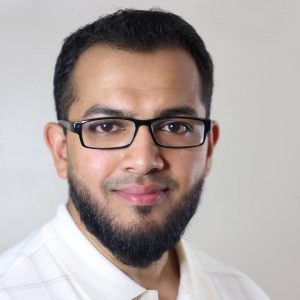 Nihal Ahmad Khan, a student in the Master of Arts in Religious Studies program, is among 14 seminary students and “early-career clergy” who will participate in the 2019 Seminary Program of the Fellowships at Auschwitz for the Study of Professional Ethics (FASPE).
Nihal Ahmad Khan, a student in the Master of Arts in Religious Studies program, is among 14 seminary students and “early-career clergy” who will participate in the 2019 Seminary Program of the Fellowships at Auschwitz for the Study of Professional Ethics (FASPE).
This two-week program brings fellows to Germany and Poland to examine how clergy and religious leaders behaved when the Nazis occupied Europe. That historical study is then related to contemporary professional ethics in five fields – business, journalism, law, medicine, and seminary.
While working on his MA in Religious Studies at Hartford Seminary, Khan is also completing coursework and research at the Harvard Divinity School.
“I look forward to FASPE’s fellowship program, as understanding how fascism can root itself in society right under our noses is a real conversation we need to be having. Ethics are values that stem from ideas in our minds,” Khan said in a press release from FASPE.
According to the release, “Khan joins a diverse group of 70 FASPE fellows across all five programs who were chosen through a competitive process that drew applicants from across the U.S. and the world. FASPE covers all program costs, including travel, food and lodging.
“The experience of the Seminary fellows is enhanced by traveling alongside the Medical fellows, who together—in formal and informal settings—consider how ethical constructs and norms in their respective professions align and differ. In 2019, the three groups will travel from June 15, 2019 to June 28, 2019, beginning their trip in Berlin and then traveling on to Krakow and Oświęcim (the town in which Auschwitz is located), Poland. In Berlin, the program includes museum visits, meeting with a Holocaust survivor and educational workshops at the House of the Wannsee Conference, the site where state and Nazi Party agencies convened in 1942 to coordinate plans for the Nazis’ ‘Final Solution.’ In Krakow, fellows will continue their seminars at Jagiellonian University, one of Europe’s oldest and most prestigious universities, and at Auschwitz, they will be guided by the distinguished educational staff of the Auschwitz-Birkenau State Museum.
“After the program, each fellow will submit an essay focused on a contemporary ethical issue of his or her choice. Select essays are published in the annual FASPE Journal, which showcases work in all five disciplines.
“FASPE maintains long-term relationships with its fellows in order to sustain commitment to ethical behavior and to provide a forum for continued dialogue. To date, FASPE has over 500 alumni across its five programs.”
This article originally appeared on the Hartford Seminary Website.
